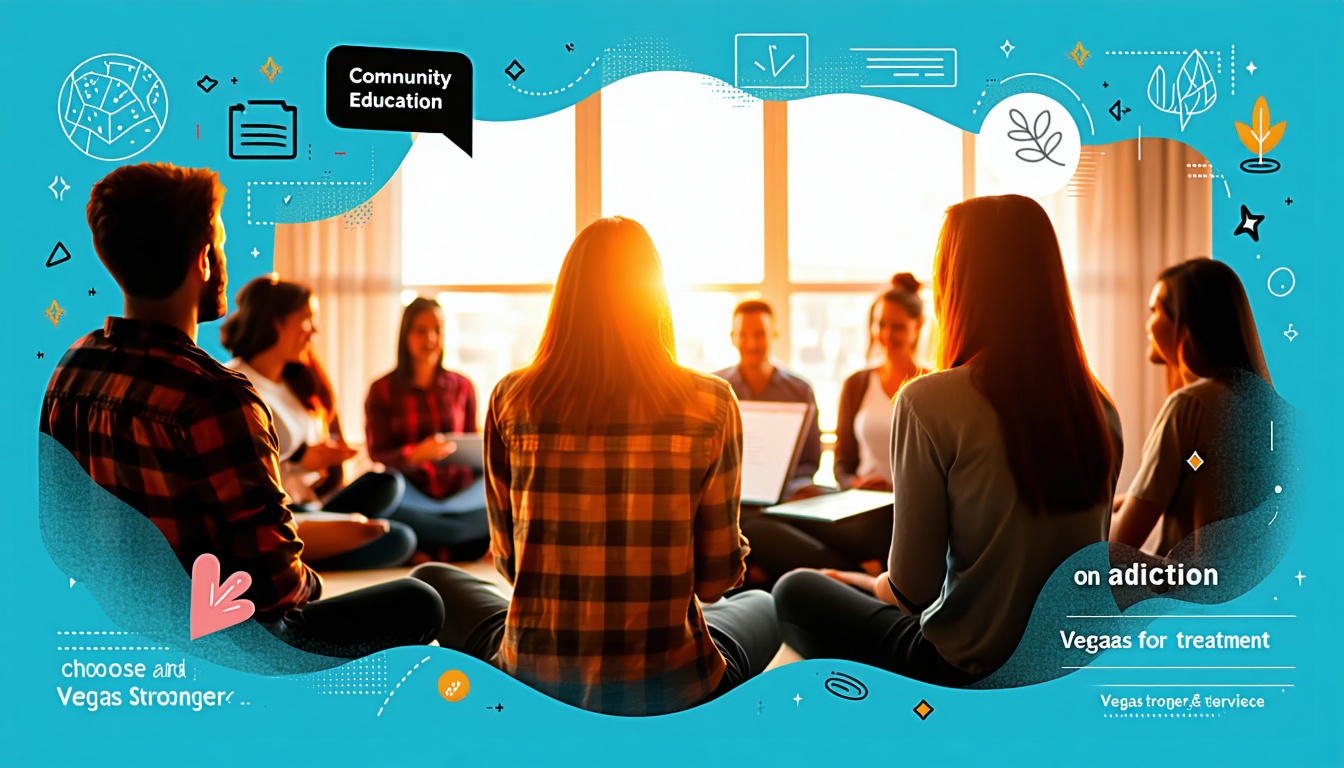Understanding Addiction
Addiction is a complex condition that affects many individuals and families. A fundamental understanding of its types and impacts is essential for those looking to help themselves or a loved one.
Types of Substance Addictions
There are various types of substance addictions that affect individuals across the United States. The most common substance addiction is alcohol use disorder, impacting about 10% of individuals aged 12 or older (Cleveland Clinic). Following alcohol, nicotine and marijuana are also prevalent in communities, presenting significant challenges for those affected.
| Substance Type | Prevalence in the U.S. |
|---|---|
| Alcohol Use Disorder | ~10% of individuals aged 12+ |
| Nicotine | High (exact % varies) |
| Marijuana | High (exact % varies) |
Understanding these prevalence rates is critical for designing community education on addiction and addressing the specific needs of each group.
Impact of Behavioral Addictions
In addition to substance use, behavioral addictions pose significant challenges. These can include gambling, internet usage, and food-related addictions, among others. Such behaviors can lead to various negative health outcomes, both physically and mentally. Communities are increasingly recognizing the need for education around these issues, as they often lead to long-term consequences similar to substance misuse.
Engaging in community events can foster awareness and provide support for both individuals and families dealing with these types of addictions. Investigating the effects of early onset of substance use and behavioral addiction is crucial since studies have shown that initial use during adolescence correlates with worse health and social outcomes as adulthood begins (NCBI PMC).
You can find more resources on addiction treatment and support services available in Las Vegas to assist both individuals and communities in addressing and overcoming these challenges.
Seeking Help for Addiction
Understanding the need for help in overcoming addiction is the first step towards recovery. This journey often requires both professional support and the backing of a strong community network.
Importance of Support Systems
Support systems play a vital role in the recovery process. Engaging with supportive friends, family members, and healthcare providers contributes significantly to effective treatment. These individuals can offer emotional support, hold you accountable, and provide encouragement during tough times. Research shows that many people manage addiction and live full, healthy lives with the right support (Cleveland Clinic).
Here are some types of support systems that can be beneficial:
| Type of Support | Description |
|---|---|
| Friends and Family | Individuals who provide emotional and practical support, helping you stay committed to your recovery goals. |
| Healthcare Providers | Professionals who can offer medical treatment and counseling tailored to your needs. |
| Support Groups | Peer-led groups where individuals share experiences and coping strategies, fostering a sense of community. |
| Online Communities | Virtual platforms providing resources, forums, and connections to others facing similar challenges. |
These networks not only help individuals find hope but also create an environment conducive to lasting change.
Treatability of Addictions
Addictions are treatable, and many people have successfully overcome substance use disorders and behavioral addictions by seeking help. With professional medical treatment and a commitment to the recovery process, individuals can lead fulfilling and healthier lives (Cleveland Clinic).
The following table outlines some common treatment options available:
| Treatment Option | Description |
|---|---|
| Outpatient Treatment | An effective option where individuals participate in treatment programs while living at home. |
| Inpatient Drug Rehab | A structured program providing intensive care and support in a residential facility. |
| Behavioral Therapy | Proven methods like cognitive behavioral therapy to address the underlying causes and behaviors associated with addiction. |
| Medication-Assisted Treatment | The use of medications like Suboxone or methadone to help manage withdrawal symptoms and reduce cravings. |
Engaging in these treatment programs can greatly increase the chances of successful recovery. If you or someone you know is struggling with addiction, consider reaching out for help through resources such as addiction counseling or group therapy for addiction.
By prioritizing support systems and understanding that addiction is treatable, you can take meaningful steps toward recovery. Community education on addiction can help you find the best resources available in Las Vegas, such as long term recovery support and transitional housing support, ensuring that you or your loved ones receive the care needed for lasting change.
Community Education on Addiction
Raising Awareness Locally
Local communities play a crucial role in combating addiction by promoting education and awareness. Initiatives that focus on dialogue around substance abuse help create an informed environment for individuals and families. This can include organizing events to discuss the safe storage of medications, proper disposal of old drugs, and the importance of consulting healthcare providers before taking prescriptions. Communities are encouraged to participate in discussions and outreach programs that illuminate the realities of addiction.
Active participation in local events not only raises awareness but also reduces the stigma associated with substance use disorders. Such efforts contribute to a more supportive network for those seeking help. Organizations like the National Council on Alcohol and Drug Dependence, Inc. (NCADD) focus on rallying volunteers for public awareness campaigns, interventions, and advocacy groups that support individuals affected by addiction Addiction Center.
| Local Initiatives | Description |
|---|---|
| Community Dialogues | Events to facilitate open discussions on substance abuse |
| Educational Workshops | Sessions to inform about safe medication practices |
| Support Groups | Networks to provide assistance for individuals and families |
National Efforts in Prevention
On a larger scale, national campaigns greatly enhance community education on addiction. For instance, every September, the Substance Abuse and Mental Health Services Administration (SAMHSA) sponsors Recovery Month. This initiative aims to increase awareness and understanding of substance abuse issues through thousands of events held across the country (Addiction Center). These events emphasize themes such as family support and share powerful recovery stories, encouraging individuals to seek help.
National organizations often provide resources and funding for local initiatives, helping empower communities in the fight against addiction. Support from programs like SAMHSA and NCADD ensures that local educators have access to the training and knowledge needed to effectively communicate about addiction recovery.
| National Initiatives | Description |
|---|---|
| Recovery Month | Annual event to promote awareness and support for recovery |
| National Policy Advocacy | Efforts directed towards public policy for addiction recovery |
| Resource Distribution | Providing communities with educational materials and training |
Supporting community education on addiction is essential for fostering healthier environments and ultimately aiding those in need of help. If you are looking for resources in Las Vegas for addiction, mental health, or homelessness assistance, consider exploring options like addiction treatment and support services for the homeless.
Prevention Programs
Effective prevention programs are essential in combating addiction and supporting community education on addiction. These initiatives often focus on youth education and family involvement, ensuring that comprehensive strategies are in place.
School-Based Initiatives
Schools serve as effective platforms for preventing substance misuse among adolescents. Evidence-based prevention programs emphasize social resistance skills training, normative education, and competence enhancement skills training. Model programs like Life Skills Training, Project Towards No Drug Abuse, and Brief Alcohol Screening and Intervention for College Students have demonstrated effectiveness in reducing substance misuse (NCBI PMC).
| Program Name | Focus Area | Target Group |
|---|---|---|
| Life Skills Training | Social skills | Middle and high school students |
| Project Towards No Drug Abuse | Substance refusal | High school students |
| Brief Alcohol Screening and Intervention | Alcohol use | College students |
Federal and state funding incentives can support schools in implementing these effective practices. By promoting awareness and teaching prevention, schools can significantly influence youth substance use (Facing Addiction in America: The Surgeon General’s Report on Alcohol, Drugs, and Health).
Family Involvement in Prevention
Family engagement is a critical component in the effectiveness of prevention strategies. Programs aimed at teaching parents how to monitor and communicate effectively with their children can greatly reduce the likelihood of substance misuse. By fostering open conversations and cultivating strong parent-child relationships, families can serve as a protective factor against addiction.
Community education initiatives that involve families not only promote awareness but also empower parents to play a vital role in their children’s lives. This involvement helps reinforce the lessons taught in schools and create a consistent message about the dangers of drugs and alcohol.
Evidence-Based Approaches
Adopting evidence-based approaches is vital in creating effective drug prevention programs. These methods focus on integrating school, family, and community-based interventions. Schools must implement programs that have a proven track record in reducing substance misuse.
The health care system also plays a role by promoting primary prevention, using evidence-based treatments, and effectively integrating prevention and treatment services (Facing Addiction in America: The Surgeon General’s Report on Alcohol, Drugs, and Health). By collaborating across different sectors, communities can enhance the quality and efficiency of care for individuals struggling with addiction.
Through comprehensive prevention programs that engage schools and families while employing evidence-based strategies, communities can foster a strong support system to reduce addiction rates and promote recovery initiatives. For more information on addiction treatment resources available in Las Vegas, visit addiction treatment or explore long term recovery support.
Substance Misuse Interventions
Understanding the different intervention strategies available for substance misuse can greatly enhance your journey towards recovery. Various group treatment models, psychoeducational groups, and skills development groups are crucial in supporting individuals facing addiction.
Group Treatment Models
Substance abuse treatment professionals utilize a variety of group treatment models to address client needs. These models include:
- Psychoeducational Groups
- Skills Development Groups
- Cognitive-Behavioral/Problem-Solving Groups
- Support Groups
- Interpersonal Process Groups
Each group model serves a unique purpose, helping individuals through various stages of recovery. For instance, psychoeducational groups aim to enhance awareness about substance use and motivate clients towards recovery (NCBI Bookshelf).
Psychoeducational Groups
Psychoeducational groups are designed specifically to educate clients about substance abuse and its consequences. The primary goal is to expand awareness and, subsequently, to motivate clients to reach recovery-ready stages. Through facilitated discussions, individuals learn about the risks associated with substance use, the nature of addiction, and the recovery process itself.
The structure of these groups often includes:
| Key Components | Description |
|---|---|
| Educational Content | Information on substance abuse and its effects |
| Group Discussions | Sharing experiences and insights |
| Motivation Strategies | Encouragement towards taking steps for recovery |
By actively participating in psychoeducational groups, individuals can better understand their addiction and become more equipped to seek help.
Skills Development Groups
Skills development groups focus on cultivating essential skills necessary for maintaining sobriety. These groups target various competencies, including refusal strategies, coping mechanisms, and critical life skills that may have been neglected due to substance abuse (NCBI Bookshelf).
The benefits of participating in skills development groups include:
| Skills Focused | Examples |
|---|---|
| Refusal Strategies | Techniques for saying no to substances |
| Coping Mechanisms | Stress management and emotional regulation |
| Life Skills | Financial management, communication, etc. |
Through these groups, individuals learn practical skills that can significantly impact their long-term recovery.
Engaging in these diverse group interventions not only fosters community support but also enhances your personal growth throughout the recovery journey. If you or a loved one are seeking more information about available resources, consider exploring options like addiction treatment or long term recovery support offered by Vegas Stronger.
Promoting Awareness and Education
Role of Education in Prevention
Education plays a vital role in preventing addiction before it starts. By raising awareness about the dangers of substances, individuals can make informed decisions and recognize early warning signs. Comprehensive education programs contribute to the development of healthier lifestyles, screen for early intervention opportunities, and support long-term wellness. They provide critical information on how drugs impact the mind and body, helping to dispel myths and misconceptions that may lead individuals to experiment with substances out of curiosity or peer pressure.
By encouraging open conversations and promoting accurate knowledge about addiction, educational efforts help to reduce stigma and foster supportive environments. Such initiatives are key components of community education on addiction.
| Education Benefits | Description |
|---|---|
| Informed Decision-Making | Individuals learn to assess risks and choose healthier lifestyles. |
| Early Warning Recognition | Programs help participants identify signs that may lead to addiction. |
| Myth Dispelling | Education dispels misconceptions about substance use and addiction. |
Community Events for Education
Community events play a crucial role in the education and prevention of substance misuse. These events serve as platforms for spreading awareness about addiction and recovery resources. They often involve collaboration among local agencies, schools, and law enforcement to target specific risk groups within the community.
Community events can include workshops, seminars, health fairs, and awareness campaigns that promote healthy behaviors and embed prevention practices into everyday life. These initiatives often aim to reduce youth access to substances and share resources available for those struggling with addiction.
Engaging community members through these events not only educates but also creates a network of support for individuals seeking help. Some examples of community initiatives may include:
| Event Type | Purpose |
|---|---|
| Workshops | Educate about the impact of substance misuse and coping strategies. |
| Health Fairs | Provide resources and information about local addiction treatment options. |
| Awareness Campaigns | Increase visibility around addiction issues, including stigma reduction. |
By participating in these community events, individuals can gain valuable knowledge and connect with resources such as addiction counseling and long term recovery support. Taking these steps contributes greatly to the overall efforts in combating addiction and supporting those in need.

















